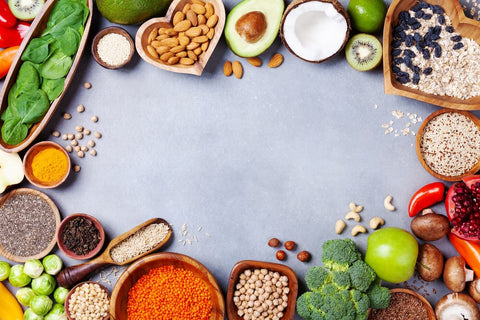Understanding the connection between diet and fertility is foundational for anyone looking to enhance reproductive health. This guide delves into how integrating a nutritional shake fortified with essential nutrients, superfoods, and particularly potent ingredients like maca and turmeric can support your journey to parenthood.
The Connection Between Diet and Reproductive Health
Essential Nutrients for Fertility
A fertility-enhancing diet focuses on key vitamins and minerals that regulate reproductive health. Folic acid, vitamin D, and zinc are critical:
- Folic Acid supports cellular growth and helps prevent birth defects in early pregnancy.
- Vitamin D is crucial for hormonal balance and reproductive health.
- Zinc plays a vital role in sperm development and ovulation.
Incorporating foods rich in these nutrients can significantly increase the chances of a healthy pregnancy.
Superfoods That Enhance Fertility
Integrating superfoods into your diet can profoundly impact fertility. These nutrient-rich foods contain vitamins, minerals, and antioxidants that support reproductive health:
Dark Leafy Greens
Spinach and kale are high in folate, which is crucial for preventing birth defects and enhancing fertility.
Berries
Rich in antioxidants, berries like blueberries and raspberries protect eggs and sperm from damage and support hormonal balance.
Quinoa and Seeds
Great sources of plant-based protein and fiber, promoting overall health and hormone regulation. Seeds like flaxseeds and chia seeds are also rich in omega-3 fatty acids, important for hormone production.
Nuts
Walnuts, almonds, and Brazil nuts provide selenium, healthy fats, and protein, all beneficial for reproductive health.
Ginger and Turmeric
Known for their anti-inflammatory properties, these spices can improve overall health and aid in reducing inflammation in the reproductive system.
Maca
A powerful superfood known to enhance energy and balance hormone levels, maca is especially valuable for fertility.
The Role of Lifestyle in Fertility
Lifestyle choices play a significant role in reproductive health. Managing weight through a balanced diet and regular exercise, reducing intake of toxins like caffeine and alcohol, and maintaining a healthy routine can all positively influence fertility.
Adapting Your Diet for Conception
Strategies for Integrating Nutrition and Lifestyle Changes
Preparing for pregnancy involves making informed choices about what you eat and how you live:
- Balanced Meal Planning: Incorporate a variety of superfoods and nutrient-rich ingredients into your meals to ensure you're getting a wide range of fertility-supporting nutrients.
- Supplemental Support: A comprehensive nutritional shake can be a convenient way to consume essential vitamins and minerals along with superfoods like maca and turmeric, ensuring you meet your daily nutritional needs.
Overcoming Dietary Challenges in Fertility
Addressing common nutritional challenges can help optimize fertility. For those with dietary restrictions or food aversions, supplementation with a comprehensive product like VORG All-in-One SuperShake ensures you receive the necessary nutrients without the stress of managing a complex diet.
VORG All-in-One SuperShake: A Nutritional Boost for Fertility
Frequently Asked Questions: Nutrition and Fertility Explained
Can nutrition help fertility?
Absolutely. Nutrition plays a pivotal role in fertility for both men and women by affecting hormone levels, the quality of sperm and eggs, and overall reproductive health. A diet rich in specific nutrients such as omega-3 fatty acids, folic acid, zinc, and antioxidants is essential for enhancing reproductive functions.
What are essential nutrients for fertility?
Nutrients like folic acid, vitamin D, zinc, and omega-3 fatty acids are fundamental for good reproductive health.
What nutritional adjustments should be made to enhance fertility in the preconception phase?
Individuals looking to conceive should focus on increasing their intake of nutrient-dense foods that are high in vitamins and minerals essential for reproductive health. Reducing intake of processed foods and focusing on whole foods can help maintain a healthy weight and optimize body conditions for conception. Supplements like prenatal vitamins, which include folic acid and other essential nutrients, can also help fill any nutritional gaps.
What are the best foods to include in a fertility-enhancing diet?
A diet rich in vegetables, fruits, whole grains, lean proteins, and healthy fats is ideal for enhancing fertility. Specifically, foods like dark leafy greens, berries, nuts, and seeds provide essential vitamins and minerals. Additionally, foods rich in omega-3 fatty acids, such as flaxseeds, walnuts, and fatty fish, are crucial for hormone balance and reproductive function.
Does caffeine consumption affect fertility?
Yes, excessive caffeine intake has been linked to fertility issues, such as hormonal imbalances and reduced fertility rates. Moderating caffeine consumption is advised during the preconception period.
Can a poor diet lead to infertility?
A diet lacking in key nutrients can lead to deficiencies that negatively impact fertility. Poor nutrition can affect hormone regulation, egg and sperm quality, and overall reproductive health.
How can dietary choices enhance egg quality and overall reproductive health?
Improving egg quality involves consuming a diet rich in antioxidants, vitamins, and minerals that protect eggs from oxidative damage and support cellular health. Foods high in omega-3 fatty acids and rich in vitamins like Vitamin E and C are particularly important.
Is it too late to improve fertility through diet in your late 30s?
It is never too late to adopt a healthier diet to improve fertility. Nutritional adjustments can enhance egg and sperm quality, even in your late 30s. While age does naturally decrease fertility, a nutritious diet rich in essential vitamins and minerals can help mitigate some age-related declines in reproductive health.
Conclusion: Nourishing Your Path to Parenthood
Adopting a well-rounded diet supplemented with products like VORG All-in-One SuperShake can pave the way for enhanced fertility and a healthy pregnancy. Embrace this guide to improve your reproductive health through targeted nutrition and begin your journey to becoming a parent with confidence and good health.


